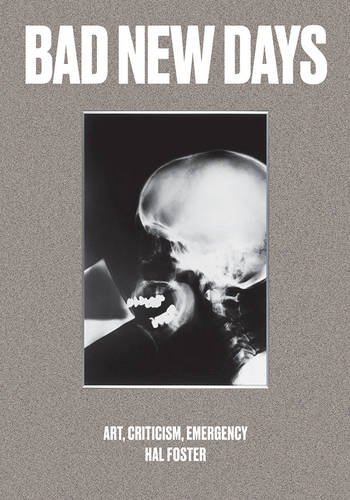Hal Foster: Bad New Days: Art, Criticism, Emergency (2015)
Filed under book | Tags: · abject, aesthetics, archive, art, art criticism, art history, critique, dialectic, fetish, mimesis, neoliberalism, poststructuralism, precarity, theory

“Bad New Days examines the evolution of art and criticism in Western Europe and North America over the last twenty-five years, exploring their dynamic relation to the general condition of emergency instilled by neoliberalism and the war on terror.
Considering the work of artists such as Thomas Hirschhorn, Tacita Dean, and Isa Genzken, and the writing of thinkers like Jacques Rancière, Bruno Latour, and Giorgio Agamben, Hal Foster shows the ways in which art has anticipated this condition, at times resisting the collapse of the social contract or gesturing toward its repair; at other times burlesquing it.
Against the claim that art making has become so heterogeneous as to defy historical analysis, Foster argues that the critic must still articulate a clear account of the contemporary in all its complexity. To that end, he offers several paradigms for the art of recent years, which he terms “abject,” “archival,” “mimetic,” and “precarious.””
Publisher Verso, London and New York, 2015
ISBN 1784781460, 9781784781460
208 pages
Presentation and discussion (video, The Kitchen, NYC, Sep 2015)
Interview (John Douglas Millar, Mute, Nov 2015)
Reviews: Mark Steven (Affirmations 2015), Brian Dillon (Guardian 2015), Rachel Wetzler (ArtNews 2015).
Comment (1)Friedrich Kittler: Musik und Mathematik I. Hellas 1: Aphrodite (2006) [German]
Filed under book | Tags: · antiquity, greece, mathematics, media, media history, media theory, mimesis, music, music history, song, writing

“‘Wir möchten euch Musik und Mathematik erzählen: das Schönste nach der Liebe, das Schwerste nach der Treue.’ Die beiden Worte, die den Titel einer Tetralogie aus Hellas, Roma Aeterna, Hesperien und Turing-Galaxis bilden, stehen für die Wurzeln von Kunst und Wissen: musikè, die Lust des Singens, Tanzens, Spielens heißt nach der Muse, die im Herzen alles aufbewahrt und daher davon sagen kann. Musik macht also nach, was Musen tun, seit sie auf ihrem Götterberg mit allem Singen angehoben haben. Aus fast dem selben Ursprung stammt mathesis, das Lehren im allgemeinen, und Mathematik, das Denken über Zahlen im besonderen. Bei Homer heißt mathein nämlich noch nicht zählen oder rechnen, wie Aristoteles gelehrt hat, mathôn nennt vielmehr ein dunkles Wissen, das Helden erst nach Jahrzehnten des Erfahrens in Fleisch und Blut gegangen ist. Unter den wenigen Reimen, die in Griechenohren widerhallten, blieb der alte Spruch von pathein/mathein, leiden und lernen unverloren.”
Publisher Wilhelm Fink, Munich, 2006
ISBN 3770537823, 9783770537822
409 pages
via lostobserver, einzelne
Reviews: Jürgen Busche (FAZ), Roland Lysell (Swedish, Samlaren).
PDF (13 MB, updated on 2019-4-20)
ARG (updated on 2019-4-20)
Aristotle: Poetics (c347-335 BCE–)
Filed under book | Tags: · literary theory, mimesis, philosophy, poetics, poetry, theatre

Aristotle’s Poetics is the earliest surviving work of dramatic theory and the first extant philosophical treatise to focus on literary theory.
The Monoskop wiki hosts passages from the Poetics selected to highlight the ambiguity of the terms central to theory of art and literature, particularly poiêsis, mimêsis and technê (in two Greek versions and three English translations), and an annotated source bibliography of editions and translations of this work into various languages.
Comment (0)
